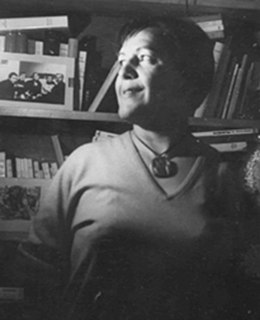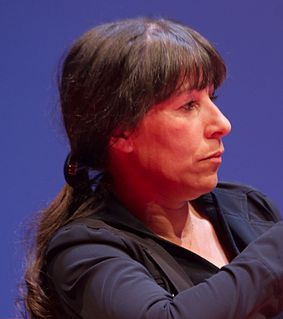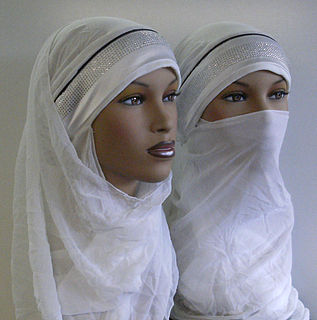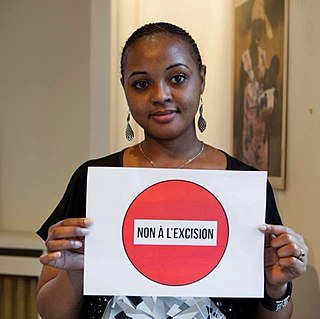
Françoise d'Eaubonne was a French author, labour rights activist, environmentalist, and feminist. Her 1974 book, Le Féminisme ou la Mort, introduced the term ecofeminism. She co-founded the Front homosexuel d'action révolutionnaire, a homosexual revolutionary alliance in Paris.

Samira Bellil was a French feminist activist and a campaigner for the rights of girls and women.
Gang rape, also called serial gang rape, group rape, or multiple perpetrator rape in scholarly literature, is the rape of a single victim by two or more violators. Gang rapes are forged on shared identity, religion, ethnic group, or race. There are multiple motives for serial gang rapes, such as for sexual entitlement, asserting sexual prowess, war, punishment, and, in up to 30% of cases, for targeting another race, ethnic group or religion.
Sohane Benziane was a French girl of Algerian ancestry who was killed at the age of 17.
The word banlieue, which is French for "suburb," does not necessarily refer to an environment of social disenfranchisement. Indeed, there exist many wealthy suburbs, such as Neuilly-sur-Seine and Versailles outside Paris. Nevertheless, the term banlieues has often been used to describe troubled suburban communities—those with high unemployment, high crime rates, and frequently, a high proportion of residents of foreign origin mainly from former French African colonies and therefore Berbers, Blacks, and Arabs.

Fadela Amara is a French feminist and politician, who began her political life as an advocate for women in the impoverished banlieues. She was the Secretary of State for Urban Policies in the conservative Union for a Popular Movement (UMP) government of French Prime Minister François Fillon. She is a former president of the organisation Ni Putes Ni Soumises.

Dans l'enfer des tournantes is a book by French activist Samira Bellil.

In France, there is an ongoing social, political, and legal debate concerning the wearing of the hijab and other forms of Islamic coverings in public. The cultural framework of the controversy can be traced to France's history of colonization in North Africa, but escalated into a significant public debate in 1989 when three girls were suspended from school for refusing to remove their headscarves. That incident, referred to in France as l'affaire du foulard or l'affaire du voile, initially focused the controversy on the wearing of the hijab in French public schools. Because of the wide-ranging social debates caused by the controversy, l'affaire du foulard has been compared to the Dreyfus affair in its impact on French culture.
Feminism in France is the history of feminist thought and movements in France. Feminism in France can be roughly divided into three waves: First-wave feminism from the French Revolution through the Third Republic which was concerned chiefly with suffrage and civic rights for women. Significant contributions came from revolutionary movements of the French Revolution of 1848 and Paris Commune, culminating in 1944 when women gained the right to vote.
Sihem Habchi has been the presiding president of Ni Putes Ni Soumises since June 2007, and is a member of the High Authority of the Battle against Discrimination and for Equality (HALDE).
Sadri Khiari is a Tunisian activist. He was an exile in France from 2003. He is active in Indigènes de la République and has written texts with the MIR's spokesperson Houria Bouteldja.
In France, rape is illegal, and marital rape is also illegal. In recent years there has been increase of reported rape cases in France.

Sylvie Tissot is a French sociologist, activist and documentary filmmaker. She is a Professor of Political Science at University of Paris-8 and a founder of the collective Les Mots Sont Importants.
The Prix du livre politique is an annual French literary prize awarded to the best political book published. The €5,000 award was established by Lire la Société, a French group whose goal is to revive interest in public affairs. The prize announcement is one of the events of the Journée du Livre Politique, organized by the group since 1991. The prize is to promote reflection, discourse and political thought. The year 2020 marks the 18th edition of this recognition, which began in 2003.

La Barbe(The Beard) is a French feminist group. It was founded in 2008. It aims at denouncing the absence or under-representation of women in contemporary culture. This includes influence and power dynamics in politics, economics and media.
Simon Tahar is a French lawyer. He has represented musicians such as Yannick Noah and MC Solaar.

Whites, Jews, and Us: Toward a Politics of Revolutionary Love is a 2016 book by the French-Algerian political activist Houria Bouteldja, first published in English in 2017.

Islamic feminist views on dress codes include feminist views on the issues surrounding women's dress codes in the Islamic religion, focusing especially on the Hijab and the Nikab.

Diaryatou Bah is a feminist and secular activist from Guinea.

Houria Bouteldja is a French-Algerian political activist. She served as spokesperson for the Indigènes de la République until 2020.













